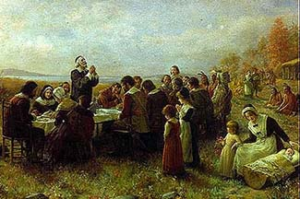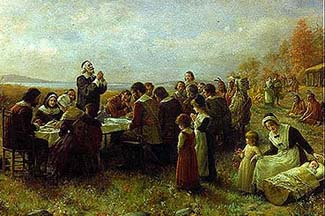Thankful Characters
 As Thanksgiving Day approaches here in the US, I’m mindful of the basis of our holiday. Primarily it was instituted in various settlements in the 1600s as a day to remember the ways in which God provided. Secondarily, it (or they, since there was no one set date in those early years) was a day of celebration for the harvest.
As Thanksgiving Day approaches here in the US, I’m mindful of the basis of our holiday. Primarily it was instituted in various settlements in the 1600s as a day to remember the ways in which God provided. Secondarily, it (or they, since there was no one set date in those early years) was a day of celebration for the harvest.
In 1621 in the settlement at Plymouth, 58 colonists hosted 90 members of the Wampanoag tribe because, by teaching them food growing and gathering skills and by donating food supplies for the winter, these native Americans were instrumental in helping the colony survive. Consequently, many see Thanksgiving as a day to express gratitude to significant friends, family, and neighbors.
The thing that impresses me about these early celebrations is the fact that they took place even though the overall picture of these colonies was quite bleak. Many people died because of disease. Supplies through the winter were meager, at best, and more people died of starvation. In addition, an attack by the Powhatan Confederacy in 1622 wiped out a number of smaller settlements and killed twenty-five percent of the Jamestown population.
 Nevertheless, the colonists, in what would later become the Commonwealth of Virginia, held any number of Thanksgiving observances. Yes, despite privation, death, dangers, and the concerns for the future, they found reason to rejoice. They exhibited a degree of contentment, a gratitude for what they had rather than resentment for what they had lost.
Nevertheless, the colonists, in what would later become the Commonwealth of Virginia, held any number of Thanksgiving observances. Yes, despite privation, death, dangers, and the concerns for the future, they found reason to rejoice. They exhibited a degree of contentment, a gratitude for what they had rather than resentment for what they had lost.
When I think of stories, however, no matter what the genre, I think of a main character who is not content. He is missing something he wants, something he needs, in order to fix a problem that has cropped up in his world. Consequently, I don’t often think of fictitious characters as being content or thankful.
Until I considered minor characters. Those who are a part of the story but who are not the central figures, may indeed exhibit thankful hearts.
Think, for example, of Gimli, the dwarf in The Fellowship of the Ring who was one of the company traveling with Frodo Baggins. He stands out in contrast to the stereotype of dwarfs as greedy and disgruntled.
First he was grateful for the opportunity of traveling into the mines of Moria and learning what happened to his kin who had sought to reestablish a community there. Second, he was ever afterward thankful for having met Galadriel, the elfin queen of Lothlórien. Later he expressed sincere happiness as a result of his friendship with Legolas.
Sam Gamgee is another Tolkien character who is a good example of one who is gratefulr. In the Shire he was thankful to be Mr. Frodo’s gardener. On the way to Rivendell, he was content to see elves, and could have died happy after that first encounter. Most of all, however, he was satisfied to walk into danger beside Frodo, to carry his burden, and in the end, to carry his friend, no matter how bleak the circumstances.
In the third volume of The Chronicles of Narnia, C.S. Lewis also created a notable character who demonstrated gratefulness: Reepicheep. He was happy to be a Talking Mouse, and became content even without his tail. Mostly he was content with his lot–being the one who would go on a quest to the end of the world, though it meant he would leave all he loved.
 In the Harry Potter series, J. K. Rowling created perhaps the best grateful character of all: the house elf, Dobby. In Harry Potter and the Chamber of Secrets, Harry Potter ends up freeing Dobby from his servitude to the Malfoy family. From that point on, Dobby is so grateful to Harry Potter that he will do whatever he can to help or protect Harry Potter, even put his own life at risk.
In the Harry Potter series, J. K. Rowling created perhaps the best grateful character of all: the house elf, Dobby. In Harry Potter and the Chamber of Secrets, Harry Potter ends up freeing Dobby from his servitude to the Malfoy family. From that point on, Dobby is so grateful to Harry Potter that he will do whatever he can to help or protect Harry Potter, even put his own life at risk.
What are some other notable characters who exhibit thankfulness? What do you think fuels these characters to be so grateful, even when their outer circumstances may not seem to warrant that attitude? For writers, do you have a grateful character in your story? For what is he or she so thankful and why? In the end, how do we as real people stack up against Reepicheep or Sam Gamgee or Dobby? Is it possible to be as sold-out grateful as these characters were?









































Interesting. I haven’t thought of that much.
Thanks for your feedback, Julie. Glad to know this article gave you something more to cogitate. 😉
Becky
[Much tangenting within]
On the flip side, thankfulness is one of those things that are better off welling naturally rather than being mandated. It’s one of those things that can be used to dismiss people and/or “keep them in their place.” Like slaves being told to be happy that they have masters who give them the bare minimum of food, clothing, and shelter and don’t beat them often. That thing about Sam Gamgee being happy to be Frodo’s gardener had me wondering if anybody had done a Marxist reading of LOTR, because there are distinct marks of classism in it (not to mention racism and sexism, but there are other vantage points for those). Which I guess is to be expected, since medieval Europe and Middle Earth carry a lot in common.
And then I started started on a long, long tangent about George MacDonald and classism (he was a man of his Victorian time), but then I deleted it and figured I probably just need to write some reviews on MacDonald’s work where I parse through all the Victorianisms and their conflation with virtue and/or religion. That might be too academic for submission to this site, but maybe that’s a sign that I need to start my own inconsistently updated blog of reviews among all the thousands of other inconsistently updated blogs of reviews on the Internet.
Continued from earlier comment:
About Sam Gamgee being happy as a gardener, I’ll admit, it gets my hackles up when someone suggests that no one could be happy “just being a gardener.” We have discredited manual labor so much in our day, I think it’s shameful. God made us to work, and in fact, before sin entered the world, He gave Adam the job of being a gardener.
If you remember the last book of Tolkien’s trilogy, it was Sam who saved the Shire by using the gift Galadriel had given him to re-grow all the trees that Saruman and his minions had destroyed. It’s a high calling, as high as any other, and I dare say Tolkien would have viewed it as considerably higher than a good many desk jobs our current culture esteems.
But about deleting your thoughts on George MacDonald, notleia, pleas don’t feel like you have to censor yourself on our behalf. If you write something more scholarly than most comments, we aren’t going to take away your Spec Faith visitors card. 😉 And I don’t think anyone is sitting back rating comments. (This one’s got the humor of comic books–an 8.2. This one’s run of the mill–5.0.) Seriously, I hope you always feel free to share your thoughts.
Becky
Go for it. I’d read about Victorian classism in the context of George MacDonald.
Reviewing/criticizing stuff is frustrating, because you are never able to express all the thoughts you had on the piece the way you wanted to, and it always takes longer than it feels like it should. And it’s usually pretty thankless. Still, it feels good to have said something real about a work, and to have contributed to the Internet’s junkyard. 😉
No question, notleia, that a thankful heart cannot be mandated. I’ve never thought that’s what Thanksgiving was. Never heard of slaves being told they had to be thankful for what their masters gave them, though I don’t doubt that could have happened. Rather, as I read about the history of Thanksgiving Day, it seemed to grow from all these local communities holding a day of thanks celebration in a rather chaotic manner–some years having one, some years not, never on the same day or at the same time as a neighboring community. I think as the nation began to form a more cohesive national identity, the push began for a national day. President Lincoln saw it as a way of bringing unity, and established the national day right in the middle of the Civil War.
To be continued
Ah, dear Sam. Happy with his own little garden, not a garden “swollen to a realm. His own hands to use, not the hands of others to command.” Thanks for reminding us of these truths, to be, like Paul, autarkes — “content” — not allowing anything to get between us and our Maker. The essence of sin is, after all, to hanker after “more” and no matter how we can get “it” — thank you so much for turning our hearts back to God’s Truth!